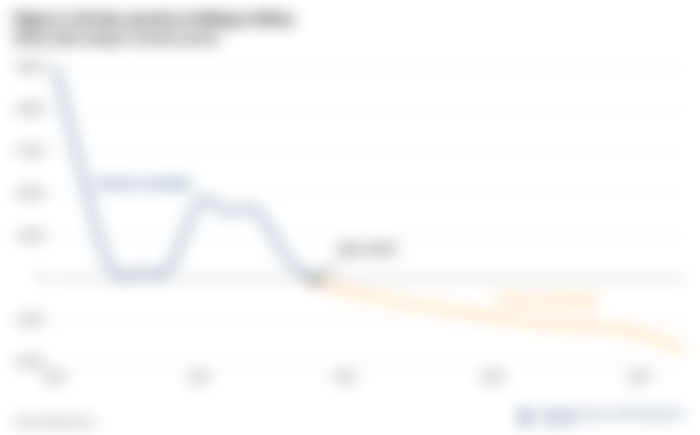Africa is the world’s last frontier in the fight against extreme poverty. Today, one in three Africans—422 million people—live below the global poverty line. They represent more than 70 percent of the world’s poorest people.
However, there is light at the end of the tunnel. According to projections from the World Data Lab, Africa has now reached a milestone in the fight against poverty. As of March 2019—and for the first time since the start of the SDGs—more Africans are now escaping extreme poverty than are falling (or being born) below the poverty line (Figure 1). The pace of this net poverty reduction is currently very small: only 367 people per day. Nevertheless, by the end of this year, this rate will increase to over 3,000 people per day, resulting in a 1 million-person reduction in total African poverty in 2020.

If these broad trends continue, by 2030, Africa will reduce the ranks of its extremely poor by 45 million and relative poverty will decline from 33.5 percent today to 24 percent. However, this still means that the continent will fall short of achieving Sustainable Development Goal (SDG) 1, eradicating extreme poverty by 2030. Approximately 377 million Africans will still be living on less than $1.90 a day and very few African countries will have ended poverty.
The most significant challenges for reducing poverty in Africa are found in just two countries: Nigeria and the Democratic Republic of the Congo (DRC). Taken together, the 150 million citizens of these two countries represent more than one-quarter of total poverty in Africa today—and are expected to represent almost half of Africa’s poor by 2030. Even though Nigeria is expected to lift nearly 10 million of its citizens up to the middle class (or beyond) over the next decade—relative poverty shares will decrease by almost 3 percent—the absolute number of poor people in Nigeria will still increase by some 20 million due to rapid population growth. In the DRC, relative poverty is projected to drop by as much as 15 percent but the absolute number will increase by almost 2 million, meaning over half the population will still be living in extreme poverty by 2030.
By 2030, Africa will represent approximately 87 percent of the global poor—the main hotspots outside Africa will be Haiti, Papua New Guinea, Venezuela, Afghanistan, and North Korea.
However, many countries are making progress towards ending poverty, including in sub-Saharan Africa. Today, four countries already have poverty rates of below 3 percent: Equatorial Guinea, Gabon, Mauritius, and Seychelles. Currently, Mauritania and Gambia are projected to join this group by 2030. There are six additional countries whose poverty rates are expected to reach below 5 percent. With a slight acceleration of growth, these economies could also make extreme poverty history by 2030:
Ethiopia, Africa’s second largest economy, is projected to lift 22 million people out of extreme poverty by 2030, reducing the percentage of Ethiopians living in extreme poverty from 25.6 percent today to 3.9 percent. If the poverty escape rate can be accelerated, the country will fulfill SDG 1 by 2030.
Ghana is projected to lift approximately 2 million people out of poverty by 2030 while its population grows around 24 percent to 36.1 million. Even with this demographic challenge, the country will reduce the percentage of its total population living in extreme poverty to 4.5 percent from 12.5 percent today.
Kenya will make a leap forward and is projected to lift 3.5 million of its citizens out of poverty. By 2030, Kenya will reduce the percentage of Kenyans living in extreme poverty from 20.9 percent today to 4.3 percent. The country will be achieving this milestone even though its population is projected to add around 23 million people.
Angola is currently experiencing a short-lived period where poverty is rising. This began in September 2017. However, World Data Lab forecasts indicate that by 2021, extreme poverty will fall again and by 2030 it will be an estimated 3.5 percent. If this trend can be reversed sooner, then the country also stands a great chance of fulfilling SDG 1.
Côte d’Ivoire will also make substantial progress in poverty reduction. By 2030, 5.3 million of its citizens are projected to be lifted out of poverty, bringing down the percentage of citizens living in extreme poverty from 17.2 percent today to 4.9 percent.
Djibouti, the smallest country in this set of poverty-reducing economies, is projected to reduce relative poverty from 14.2 percent to 4.6 percent—lifting over 80,000 of its citizens out of poverty by 2030.
If current trends stay as they are, Ethiopia and Kenya are projected to achieve SDG 1 by 2032; Ghana, Angola, and Côte d’Ivoire in 2033; while Djibouti will follow a year later in 2034.
As the global poverty narrative shifts towards Africa, including at this year’s U.N. General Assembly, it seems clear that ending extreme poverty by 2030 seems almost impossible at this point. However, it is important to note that the continent has turned the corner and poverty levels could come down substantially over the next decade.
we have 1 charity the charity founded for help poor peoples to get food and medical support us
if you want talk to us +251919083108/+251966890742
donate to us SAVE LIVE!!!!!

Thank you for this article on poverty in Africa. I don't just believe these ratings being done by some group of persons outside Africa, who do not really know what is happening in the continent. They base most of their ratings on the information obtained from the internet- "fallacy" I may not know much about other African countries, but Nigeria, my country is in total mess economically. The economy is in recession right now; we keep borrowing money on monthly basis, budgets could not be financed, unemployment rate is high, people are losing jobs daily, many people cannot afford two square meals, governments have no database to plan for the citizenry....to mention a few. With all these negative parameters, someone, somewhere outside Nigeria is saying poverty is going down. "Pure fallacy".